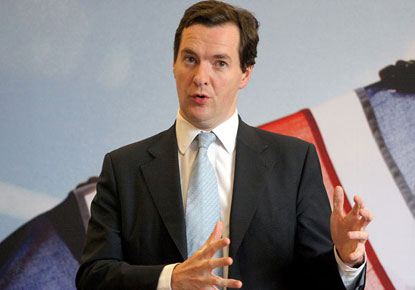By Vivienne Russell | 26 November 2012
The Institute for Fiscal Studies has added its voice to speculation that the chancellor will have to ditch his debt-reduction target in next week’s Autumn Statement.
George Osborne has set himself two fiscal targets: to eliminate the structural deficit and for debt to fall as a proportion of national income by the end of the Parliament.
But in a report published today, the IFS said the weak economic outlook meant the chancellor was likely to miss the second of these two targets. Government borrowing for this year is on course to be £13bn higher than the Office for Budget Responsibility forecast in the March Budget, largely because of disappointing tax yields.
The IFS report, Autumn Statement 2012: more fiscal pain to come?, sets out two scenarios for the public finances. An ‘optimistic’ one regards the recent increase in borrowing and declining economic outlook as temporary phenomena; a ‘pessimistic’ one regards these factors as permanent.
But under both scenarios, debt would be on course to rise as a share of national income between 2014/15 and 2015/16, by £15bn and £27bn respectively.
The IFS added that the borrowing target ‘does not actually have much to commend it in terms of the economics of managing the public finances’. It added: ‘The chancellor would likely be best advised to abandon the rule and consult on replacing it with something that better ensures long-run sustainability rather than engage in significant further fiscal tightening in order to remain on course to comply with this target.’
Under the ‘pessimistic’ scenario, Osborne would have to extend public spending cuts to 2017/18 to meet his main fiscal target. This would mean seeing through the £8bn in welfare cuts mooted in the March Budget and implementing a further £11bn of tax increases or welfare cuts on top.
IFS deputy director Carl Emmerson said tax receipts had undershot even what this year’s weak growth would suggest. ‘As a result, the chancellor might find himself having to abandon one of his fiscal targets.’
Emmerson added: ‘If much of the additional weakness this year feeds into a permanently higher outlook for borrowing, then in order to comply with his other fiscal target Mr Osborne would need to announce yet more tax rises or spending cuts for the next Parliament in next week’s Autumn Statement. In that case the planned era of austerity could run for eight years – from 2010/11 to 2017/18.’



The Institute for Fiscal Studies has added its voice to speculation that the chancellor will have to ditch his debt-reduction target in next week’s Autumn Statement.

George Osborne has set himself two fiscal targets: to eliminate the structural deficit and for debt to fall as a proportion of national income by the end of the Parliament.
But in a report published today, the IFS said the weak economic outlook meant the chancellor was likely to miss the second of these two targets. Government borrowing for this year is on course to be £13bn higher than the Office for Budget Responsibility forecast in the March Budget, largely because of disappointing tax yields.
The IFS report, Autumn Statement 2012: more fiscal pain to come?, sets out two scenarios for the public finances. An ‘optimistic’ one regards the recent increase in borrowing and declining economic outlook as temporary phenomena; a ‘pessimistic’ one regards these factors as permanent.
But under both scenarios, debt would be on course to rise as a share of national income between 2014/15 and 2015/16, by £15bn and £27bn respectively.
The IFS added that the borrowing target ‘does not actually have much to commend it in terms of the economics of managing the public finances’. It added: ‘The chancellor would likely be best advised to abandon the rule and consult on replacing it with something that better ensures long-run sustainability rather than engage in significant further fiscal tightening in order to remain on course to comply with this target.’
Under the ‘pessimistic’ scenario, Osborne would have to extend public spending cuts to 2017/18 to meet his main fiscal target. This would mean seeing through the £8bn in welfare cuts mooted in the March Budget and implementing a further £11bn of tax increases or welfare cuts on top.
IFS deputy director Carl Emmerson said tax receipts had undershot even what this year’s weak growth would suggest. ‘As a result, the chancellor might find himself having to abandon one of his fiscal targets.’
Emmerson added: ‘If much of the additional weakness this year feeds into a permanently higher outlook for borrowing, then in order to comply with his other fiscal target Mr Osborne would need to announce yet more tax rises or spending cuts for the next Parliament in next week’s Autumn Statement. In that case the planned era of austerity could run for eight years – from 2010/11 to 2017/18.’





















